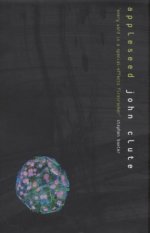
Appleseed
John Clute
337 pages
published in 2001
John Clute is best known as a science fiction critic, rather than a science fiction writer. In his criticism (partially online at Excessive Candour, as well in his editing of the two editions of The Encyclopedia of Science Fiction he has pushed a point of view of science fiction which emphasises both the virtues of the gerne as well as the importance of more traditional literary values.
With this background, it is hard not to see Appleseed as a deliberate statement, a lesson in how to write a proper space opera. This raises expectations that are hard to overcome. It also makes it a bit more difficult to review this novel: should you review it in the context of Clute's career or not? I certainly read this differently than if it was written by some unknown writer. You have to be careful neither too give too much slack nor to be too vindictive, depending on your opinion of Clute as a critic.
Personally, I've enjoyed his criticism for the most part, whether or not I agreed with it, which is one of the reasons why I searched out Appleseed in the first place. The other reason was the minor reputation this novel had built up since its publication. Almost every review I've read mentions how complex Clute's writing is and how difficult it is to read. I have to say that I was a bit disappointed to find out this was much exagerrated. Certainly Clute has a large vocabulary and he isn't afraid to use ten words where one would do, but on the whole this was no more difficult than any other intelligent space opera.
Which doesn't mean that Appleseed was an easy read. At times Clute's writing grew wearisome, his stylistic and vocabulary tricks tiresome. He posses neither the clarity of writing Heinlein at his best had, nor the stylistic flourish of Zelazny at his best. There is a certain detachment to his writing, a trace of misplaced irony. It doesn't sparkle, it is too complex to be transparant and too plodding to be entirely enjoyable in its own right. If what Clute was trying to do was create a dense futuristic patois, he didn't succeed. It was at alternating times too bombastic or too ridiculous.
Beyond the writing itself there's of course the plot, which was rather pedestrian. It revolves around Nathaniel Freer, a solitary interstellar trader with a Mysterious Past who is More than he Seems. The novel starts with Freer arriving at the planet Trencher, there to pick up a shipment, when he is attacked; not only that, the planet is hit by the mysterious Plague, that destroys or kills the AI "Made Minds" and paralyses most "meat" species, expect for Homo Sapiens like Freer. Soon after his escape he encounters the mysterious space station Klavier, home of the enigmatic Appleseed, while under attack by his enemies. Here things come to a head as Freer learns who he really is and why Homo Sapiens are so important and special.
To be fair, the plot is not why you should read Appleseed. Its real attraction is the future world Clute draws for us. The description of Trencher is wonderful, as are the ways in which Clute describes the operation of Freer's ship or the relationships between the Made Minds and the Meat people. An example from early in the book:
"Above the ship the passages of entry into Trencher flexed shut. Great spasms of light flickered off walls a klick distant. Hundreds of ships were visible, each cradled into its loading dock. Robot drones swooped through the maze, their prehensile claws guiding wires and tubes and cargo shoots into place. Hollow transport braids of all three authorised hues wove from ship to ship, giving crews and passengers access to the interior webs of the world."
When he's on, Clute puts images in your mind with the exactness of a brain surgeon. When he isn't on, he just creates streams of irritating almost nonsense, a tendency mostly found in his dialogue:
'Aye I rode,' said Cunning Earth Link, straightening herself at last. 'Bungling downwards into the shivery halls of Trencher Underneath I rode sigillum, sirrah, kaboom, kaboom, a Valkyrie, a wisenheimer. I followed traceries of your course, sure! Dead easy! You and Kirtt do kaffeeklatch! Gab gab gab gab! I followed you like Huck Finn follows the Mississippi, just as in preternaturally Old Book of era of your empathy choice on Human Earth in Universal Book.'
In the end, Appleseed is a half failure: a book more interesting in concept than in realisation. It is full of ideas other writers could fuel whole novels with, but choked to a plot that is rather substandard. I don't think I entirely "got" Appleseed, but I'm not sure whether there is much there to be gotten. Recommended for those who like to experiment and aren't angry when an experiment doesn't work out.
